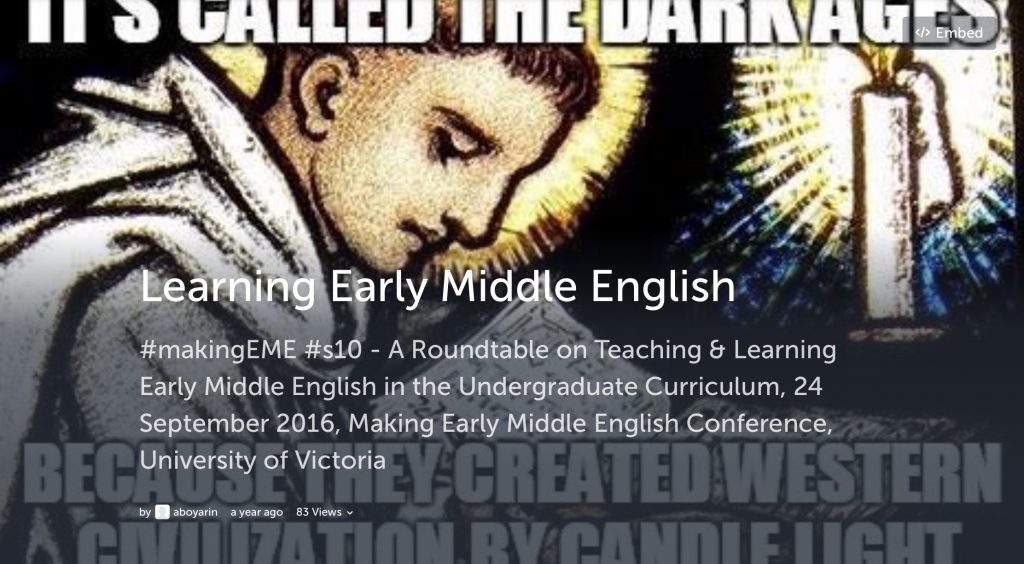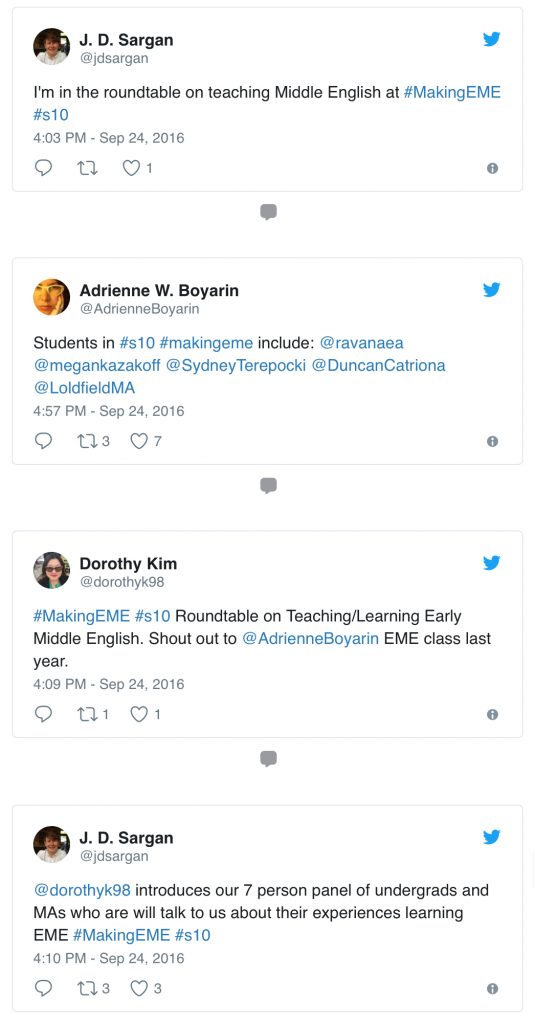UNIVERSITY OF BRITISH COLUMBIA, VANCOUVER
DEPARTMENT OF FRENCH, HISPANIC AND ITALIAN STUDIES
RMST 221B: SYLLABUS, 2019 WINTER TERM 1
ANIMAL READING
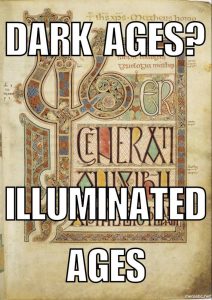
ACKNOWLEDGEMENT
UBC’s Point Grey Campus is located on the traditional, ancestral, and unceded territory of the xwməθkwəy̓əm (Musqueam) people. The land it is situated on has always been a place of learning for the Musqueam people, who for millennia have passed on their culture, history, and traditions from one generation to the next on this site.
NAVIGATION
- acknowledgement
- course information: contacts, prerequisites, corequisites, course structure
- learning: with which materials, what, how, why
- policies
- weekly schedule: including schedule of assessments
COURSE INFORMATION
| Course title | Course code number | Credit value |
| Literatures and Cultures of the Romance World I: Medieval to Early Modern | RMST 221B | 3 credits |
CONTACTS
| Your instructor | Contact details | Office location | Office hour |
| Dr Juliet O’Brien pronouns: she, her, hers |
Canvas inbox or juliet.obrien@ubc.ca |
Ponderosa Annex E 222 | t.b.a. in week 1 of term |
Your instructor reads correspondence during regular working hours: Monday to Friday, 9:00 a.m. to 6:00 p.m. I will respond to your emails as soon as possible, usually within 1-3 working days.
PREREQUISITES
None.
COREQUISITES
None.
COURSE STRUCTURE
A fluid mix of—to translate other academic areas’ categories—interactive lectures, discussion, and improvisation. Classes are in English. Class locations are on the Student Service Centre..
LEARNING:
WITH WHICH MATERIALS, WHAT, HOW, WHY
LEARNING MATERIALS
Required
- The Lais of Marie de France, ed. and trans. Glyn S. Burgess (Penguin Classics, any edition)
ISBN 9780140447590 (or e-book) - Montaigne, The Complete Essays, ed. and trans. M. A. Screech (Penguin Classics, any edition)
ISBN 9780140446043 (or e-book)
You may share—and thereby share the cost of—these texts with a colleague in class, as working with peers, including reading collectively, is encouraged.
Recommended
(list coming up at end of week 1, inc. books borrowable from O’Brien)
Supplementary
Some other materials, such as supplementary resources, will be available online (Canvas, UBC Blogs, Twitter.)
LEARNING RESOURCES
- UBC Library
- O’Brien books in office + further suggestions via her
- Œcologies research group
LEARNING OBJECTIVES
This course aims to provide you with:
- a deeper knowledge about the medieval European world: its culture and literature, against the broad lines of its historical background
- a grasp of how those fit into broader schemes and spheres of reference: European culture before c. 1700, the “pre-modern” world, world literature, literature in English, comparative literature, translation (in the broadest sense), and contemporary global—including local—cultures, including but by no means limited to literature
- reading skills: from fast general-gist reading to very slow, careful, attentive, meticulous close-reading that includes rereading
- fundamental research skills: library, catalogues, databases, reference works, online sources and resources; the collection and sorting of data, prior to its analysis and use; bibliography and synthesis
- writing skills: from short pithy paragraphs to longer forms; constructing sound arguments; using textual evidence and good reasoning; with an emphasis on commentary: the “close writing” that parallels close reading
- the intellectual tools to think as and beyond oneself: as a humanimal, as an animal, as an integral interactive part of multiple larger ecosystems (class, university, society, world)
- last but not least, the development, enhancement, and honing of critical and creative thinking, presentation, and discussion skills: analogy and allegory—paralleling exegesis and analysis—and innovation
LEARNING ACTIVITIES
In class
As it is a living humanities course, RMST 221B involves face-to-face work in class, with an emphasis on working collaboratively in pairs and small groups. Your active participation is expected. This includes speaking in class: interaction with peers, preparedness and willingness to ask and answer questions and share ideas, and contribution to work in small groups.
Please bring texts with you to class. Your instructor and/or a discussion group may also ask you to prepare work in advance for a specific class (ex. a question for discussion) or to complete online (ex. on Canvas); if that is the case, they will inform you accordingly.
Some assessed work is in class: discussion (follows by commentary in Canvas discussion).
Outside class
As is usual with university-level courses, you should expect to spend at least TWO hours outside class (regular preparation, homework, and practice) for every hour spent in class. For a three-hour class, that is at least six hours’ work; or, a little over an hour every day during the week, and the weekend off. This course will involve a lot of reading and thinking. Work outside class:
- Should be your own work: it is important to your learning to make your own mistakes, and to learn from them.
- You are strongly encouraged to work together with peers in our class, in pairs or small study groups, to reinforce what you have learned in class while it is still fresh in your mind.
Some assessed work is to be submitted online, via Canvas; some (public knowledge project) on UBC Blogs.
ASSESSMENTS OF LEARNING
I. CLASS (20%)
- Attendance, participation, weekly reading commentary: 15%*
- Responsible for one discussion session (by group: with group members distributed to circles, preparing background reading as experts): 5%* **
II. PUBLIC KNOWLEDGE (10%)
- “Humanimals Reading: A Local Bestiary”
Object selection and commentary (individual or in a group of 2-4); may be pseudonymous and/or collaborative; may also overlap with group project work in III below): 10%**
The bestiary will be organised in accordance with Marie de France’s Fables and with bestiaries via Isidore of Seville and Brunetto Latini. (We’ll work on organisation together.) An object could be an animal, a representation of an animal, an object or idea associated with or made out of animal; it could include digitised manuscripts, MOA inhabitants, live action video, etc. “Local” isn’t necessarily just UBC but is open to student individual interpretations, so as to be true to themselves.
III. PROJECT (40%)
- individual or in a group of 2-4 people
- visit office hours (1) to discuss ideas: 5%*
- planning, sketch, draft, methodology, bibliography: 5%*
- visit office hours (2) to discuss progress: 5%*
- work sample (may be a version of the object commentary in II above, contextualised within your project): 5%*
- poster presentation (see IV below)
- final project: 20%
IV. ANTI-EXAM (30%)
- poster presentation of project: 15%
- written commentary on at least three other projects, in relation to the course theme and set readings: 15%**
* = self-evaluation (at least in part: to be discussed in class in weeks 1-2)
** = peer evaluation
Schedule of assessments:
- See the weekly schedule at the end of this syllabus.
POLICIES
UNIVERSITY POLICIES
UBC provides resources to support student learning and to maintain healthy lifestyles but recognizes that sometimes crises arise and so there are additional resources to access including those for survivors of sexual violence. UBC values respect for the person and ideas of all members of the academic community. Harassment and discrimination are not tolerated nor is suppression of academic freedom. UBC provides appropriate accommodation for students with disabilities and for religious observances. UBC values academic honesty and students are expected to acknowledge the ideas generated by others and to uphold the highest academic standards in all of their actions. Details of the policies and how to access support are available on the UBC Senate website.
COURSE POLICIES
In addition to UNIVERSITY POLICIES above, Syllabus (3): HELP provides links to help you and for you to find advice and assistance:
- Advising via the department of FHIS
- Academic advising in the Faculty of Arts and throughout UBC
- Where to find information and help for everything in UBC life: well-being, accessibility, health, security, finance, being an international student, and other matters of identity and being
- UBC policies and procedures, rules and regulations, and the Ombuds office
If in doubt, if you have any questions or worries about anything, please ask! This course, your class, and your instructor are a safe space and here to help. If we don’t know an answer—we’re human—we’ll help you to find someone who does. This is a community of care.
Policies specific to this course:
- Attendance is required.
- An instructor can only do for one student what they can also do for every other student in the class/course; and they cannot do something for one student that they could not also do for every other student (ex. individual tutoring). Please note that an instructor’s office hours are NOT for individual tutoring or catching up on missed classes. For catching up with missed classes, we would recommend working with peer colleagues from your class.
- No extra credit.
- No re-weighting of marks (ex. from a missed assessment onto a later assessment).
- Late work will not be accepted.*
- No make-up alternatives for missed in-class assessments.*
- No re-grading of marked work.*
* For exceptions to the three last policies above, in exceptional circumstances and with supporting evidence for your absence, see syllabus (2): The Rules:
- late work, extensions, and making up for missed work
- rescheduling examinations
- and quick links to UBC rules, policies and procedures: including how to make a formal request for a review of an assigned grade
These rights, rules, and responsibilities are in addition to, not instead of, all policies and guidelines as supplied by the University, Faculty of Arts, and Department of FHIS. You are expected to be cognizant with University rules and regulations: this is part of the contractual agreement every student enters into with the University when they register.
LEARNING ANALYTICS
This course will be using the following digital learning technologies:
- Canvas
- UBC Blogs (WordPress)
I will not use your analytics data. It is possible that your analytics data might be used by others in the university; this should be for purposes of teaching and learning, subject to your consent, and open to FOI request.
COPYRIGHT
All materials of this course (course design and assessments; syllabus; class handouts, slides, notes, photographs of work on the board; etc.) are my intellectual property, or licensed to be used in this course by the copyright owner. Students have permission to record my classes—audio only—but not to redistribute or sell these course materials. Redistribution of these materials by any means without permission of the copyright holder(s) constitutes a breach of copyright and may lead to academic discipline.
WEEKLY SCHEDULE
Including schedule of assessments: assessed work is in bold and underlined.
WEEK 1
MONDAY: NO UBC CLASSES, LABOUR DAY
TUESDAY: NO UBC CLASSES, IMAGINE UBC DAY
- Introduction, syllabus, a first exercise reading animals via #rmst221b and @rmst221b
- TO DO for next week: consider the frog (a real live one, Museum of Anthropology, representations in anything that you have read or watched)
WEEK 2
- TOPIC:
Introduction: starting small with a frog in a poem – context: a bigger picture, whole book, ecosystem - Animal of the week: frogs
- READINGS:
Prologues, prefaces, and bodies of knowledge:- Marie de France Lais + Fables prologues
- Michel de Montaigne I.1, II.18, III. 2 & 8
- encyclopaedias, bestiaries, and other big books
- TO DO for next week: reading commentary
WEEKS 3-4
WEEK 3 TUESDAY: DEADLINE FOR CHANGES OF REGISTRATION (SSC, ONLINE) WITHOUT A “W”
- TOPIC:
Animals communicating with humans and reading them, anthropomorphic animals, and metamorphosing humans - READINGS:
- Marie de France: Bisclavret, Yonec
- Montaigne: I. 8, 11, 14, 36, 48 – II. 11, 27, 30
(O’Brien will assign you 1-2 essays per week from this set of suggestions, for Thursday discussions) - (+ II. 12 excerpts)
- WEEK 3:
- Animals of the week: werewolves, wolves, dogs, horses
- Tuesday: set up groups for weekly discussions (after the add/drop/course change deadline)
- Thursday class: a first session of reading in groups
- TO DO for next week: reading commentary + discussion questions
- WEEK 4:
- Animals of the week: birds (and children, and justice)
- Thursday class: a second session of reading in groups, this time with students facilitating groups
- TO DO THIS WEEK: project (stage 1, ideas): see O’Brien
- TO DO THIS WEEK: WEEK 5 GROUP to see O’Brien in office
- TO DO for next week: reading commentary + discussion questions
WEEKS 5-6
- TOPIC:
Animals as messengers between humans, enabling humans to read other humans - READINGS:
- Marie: Yonec, Guigemar, Milun, Laüstic
- Montaigne: I. 38, 42-43, 49, 55 – II. 6, 9, 15, 22, 25, 37 – III. 4, 6
(this fortnight’s discussion groups will assign you 1-2 essays per week from this set of suggestions, for Thursday discussions)
- WEEK 5:
- Thursday class: WEEK 5 GROUP facilitated discussion
- TO DO THIS WEEK: WEEK 6 GROUP to see O’Brien in office
- TO DO for next week: reading commentary + discussion questions & feedback
- WEEK 6:
- Thursday class: WEEK 6 GROUP facilitated discussion
- TO DO THIS WEEK: project (stage 2, planning): see O’Brien
- TO DO THIS WEEK: WEEK 7 GROUP to see O’Brien in office
- TO DO for next week: reading commentary + discussion questions & feedback
WEEKS 7-8
- TOPIC:
Humans transforming into reading - READINGS:
- Marie: Laüstic, Chaitivel, Chievrefoil
- Montaigne: I. 17, 25-26, 51, 56-57 – II. 8, 10, 26 – III. 12-13
(this fortnight’s discussion groups will assign you 1-2 essays per week from this set of suggestions, for Thursday discussions)
- WEEK 7:
- Thursday class: WEEK 7 GROUP facilitated discussion
- TO DO THIS WEEK: WEEK 8 GROUP to see O’Brien in office
- TO DO for next week: reading commentary + discussion questions & feedback
- WEEK 8:
- Thursday class: WEEK 8 GROUP facilitated discussion
- TO DO THIS WEEK: project (stage 3, progress): see O’Brien
- TO DO THIS WEEK: WEEK 9 GROUP to see O’Brien in office
- TO DO for next week: reading commentary + discussion questions & feedback
WEEKS 9-10
- TOPIC:
Humans transforming into environment - READINGS:
- Marie: Chievrefoil, Le Fresne, Les deux amanz, Lanval
- Montaigne: I. 2-8, 13, 15-16, 18-19, 22
(this fortnight’s discussion groups will assign you 1-2 essays per week from this set of suggestions, for Thursday discussions)
- WEEK 9:
- Thursday class: WEEK 9 GROUP facilitated discussion
- TO DO THIS WEEK: WEEK 10 GROUP to see O’Brien in office
- TO DO for next week: reading commentary + discussion questions & feedback
- WEEK 10:
- Thursday class: WEEK 10 GROUP facilitated discussion
- TO DO THIS WEEK: project (stage 4, work sample): to submit on Canvas
- TO DO THIS WEEK: WEEK 11 GROUP to see O’Brien in office
- TO DO for next week: reading commentary + discussion questions & feedback
WEEKS 11-12
- TOPIC:
No obvious animals: humans as animals, distinctions blur, environment transforming humans - READINGS:
- Marie: Lanval, Equitan, Guigemar, Eliduc, Prologue
- Montaigne: I. 27, 46, 50 – II. 1, 17, 23 – III. 3
(this fortnight’s discussion groups will assign you 1-2 essays per week from this set of suggestions, for Thursday discussions)
- WEEK 11:
- Thursday class: WEEK 11 GROUP facilitated discussion
- TO DO THIS WEEK: WEEK 12 GROUP to see O’Brien in office
- TO DO for next week:reading commentary + discussion questions & feedback
- WEEK 12:
- Thursday class: WEEK 12 GROUP facilitated discussion
- TO DO for next week: reading commentary + discussion questions & feedback
WEEK 13
- TOPIC:
Conclusions and self-reading: - READINGS:
- back to the frog at the beginning, prologues + Montaigne I.7 & 30
- Round-table (t.b.c.)
- TO DO THIS WEEK: public knowledge work (on UBC Blogs course site)
EXAM PERIOD
- anti-exam festive fayre of learning (a.k.a. poster presentations of projects)
- final project (5 days after exam)
FINAL FINAL FINAL AMNESTY DEADLINES FOR ASSESSED WORK…
All work must be completed by the day of your final exam at the very latest. This is for a practical reason: your instructor has to submit their final grades for your class shortly after that final exam, and as it will take them at least a couple of days to mark the final exam (and they may have other exams to mark from other classes they’re teaching), they need all marks for all other work from the course to be ready by the time they have finished marking the exam and are calculating and calibrating final grades. That having been said, individual instructors’ policies may vary on amnesties for late work, ranging from none at all (all term work due by the end of the teaching term) to a few days after the final exam.
ABOUT THE FINAL EXAM DATE
The date of the final examination is not yet known. It is not set by your instructor, the course coordinator, or the Department of French, Hispanic and Italian Studies; nor by the Faculty of Arts. They have no control over it. It is set by the Higher Authority that is Enrolment Services. The examination schedule will be available around half-way through the term, and exam locations will be posted shortly after. For more, see:
Information will be added and updated here accordingly, once it is known. Your personal examination schedule will be at the Student Service Centre; the complete examination schedule for all UBC courses may be consulted at
The examination period for this term runs from 3 to 18 December 2019 inclusive. It is strongly recommended that you not make any travel plans or purchase tickets until the examination schedules have been published: vacation or other travel is not an acceptable reason for absence from an examination.
LEARNING OUTCOMES: THINKING BEYOND THE COURSE
The marvellous medievalist meme at the top of this page is an exemplary case of what this course is aiming towards, not just at but also beyond its end: thinking Medievally and/or Medievalistically. These ends cannot (and therefore will not) be formally assessed or quantified at this course’s end. Here is an exemplary case, which also shows how such a learning outcome is vital but also fundamentally (and indeed essentially) unpredictable.
The meme at the top of this page has as its base image f. 27r of the Lindisfarne Gospels (c. 700 CE), British Library Cotton MS Nero D.IV.
The meme was made by Damian Fleming in conversation with Jonathan Hsy. He was reporting a remark arising in conversation among Catriona Duncan, Ravana Eagleheart, Megan Kazakoff, Iona Lister, Luke Oldfield, Sydney Terepocki, and Katie Yakovleva: student participants in a roundtable session on Teaching & Learning Early Middle English in the Undergraduate Curriculum at the Making Early Medieval English conference at the University of Victoria (2016). The meme’s storification adds further participants: Dorothy Kim and other online scribes live-tweeting, Adrienne Boyarin who taught the course that influenced and inspired the students.
Creative credits are therefore a conjunction of: that manuscript’s makers; a library and its preservation and digitisation teams; and a conference, its organisers and participants, and their extension and its continuation in conversations outside a formal situation and online.
Students were central contributors to this creative process, bringing in what they had been learning in formal courses and applying that learning after and outside a formal class and its assignments.
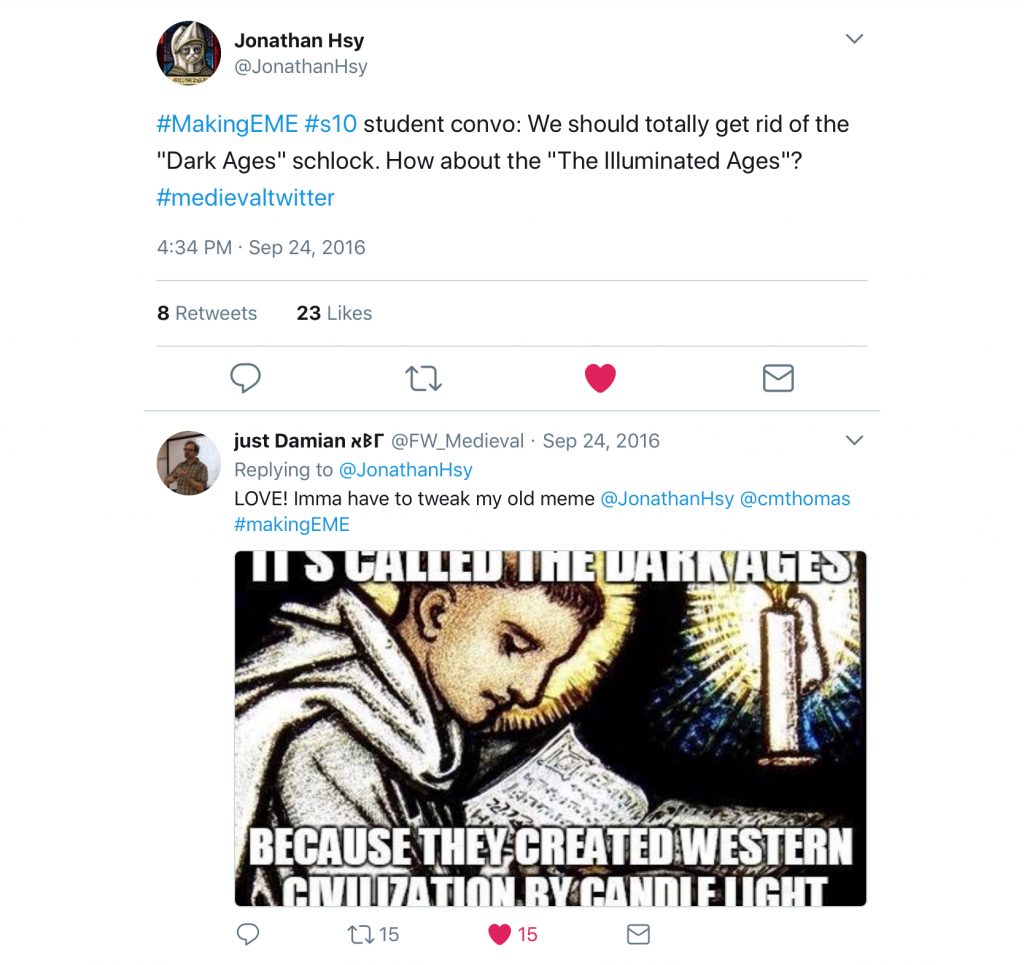
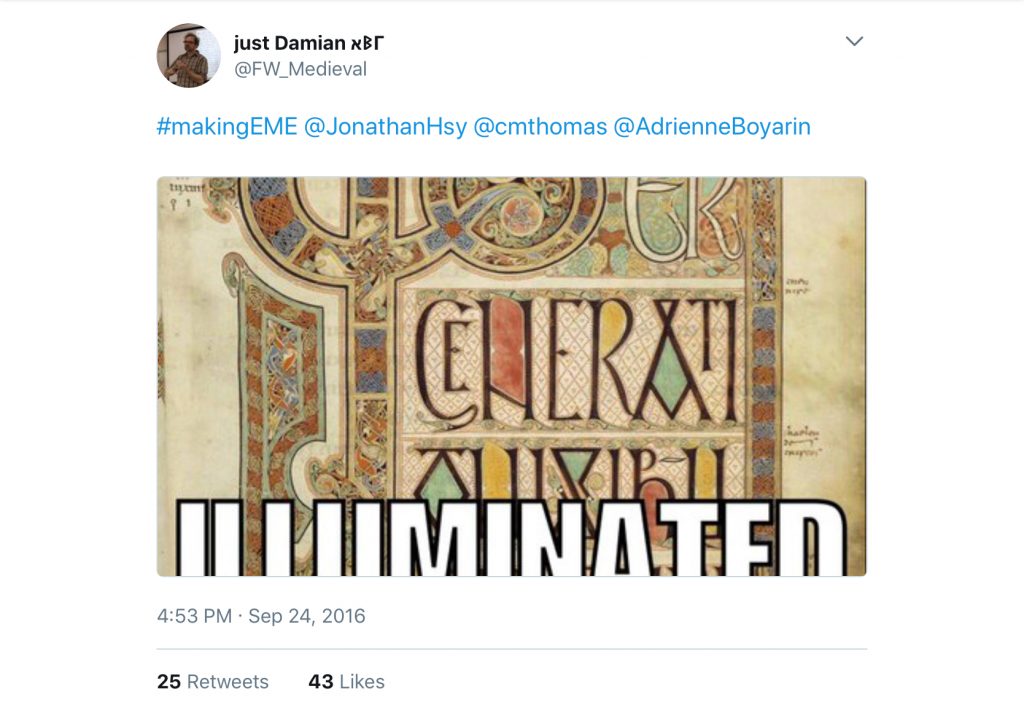
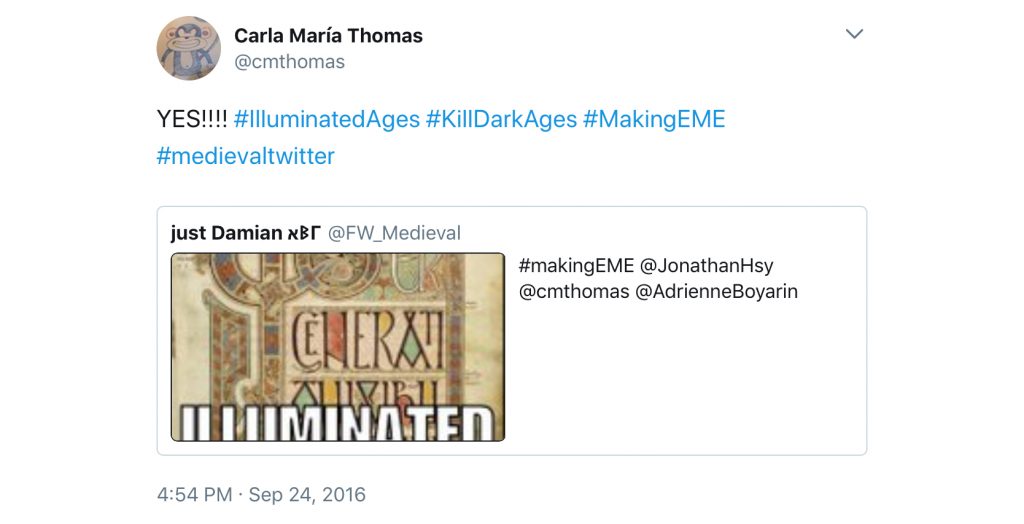
(Images above, as elsewhere on this site, are linked to their sources.)
Part of this meme’s posterity, reading and reception history, and creative and critical influence is #IlluminatedAges as a #medievaltwitter public cooperative research network innovation.
Document last revised: 2019-09-19. Sometimes a syllabus will need to be adjusted over the course of the term; that is in the nature of a flexible, responsive, interactive course in live action with human beings. Changes will only ever be in your favour: ex. if a deadline is changed for your class, it will only ever be moved forwards in time to a later date—never to an earlier one—and this will be done in consultation with you and your whole class. If I see a need to change anything after the syllabus has been distributed at the beginning of term, I will discuss the proposal with the class and then, if you agree to the proposed change, I will update the syllabus. A new, dated electronic syllabus will be emailed to you and provided on Canvas.
